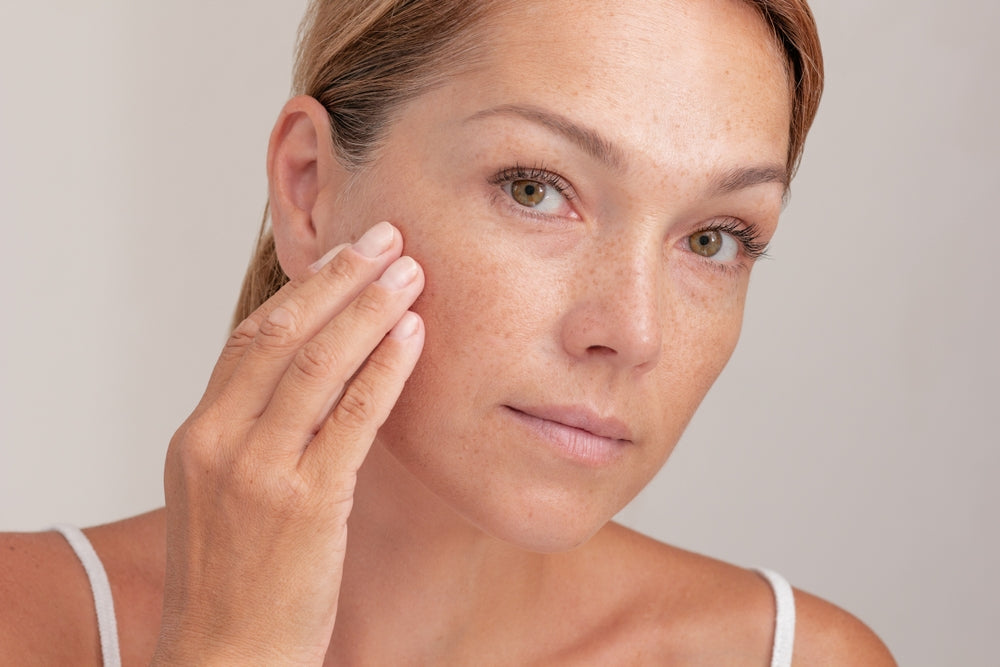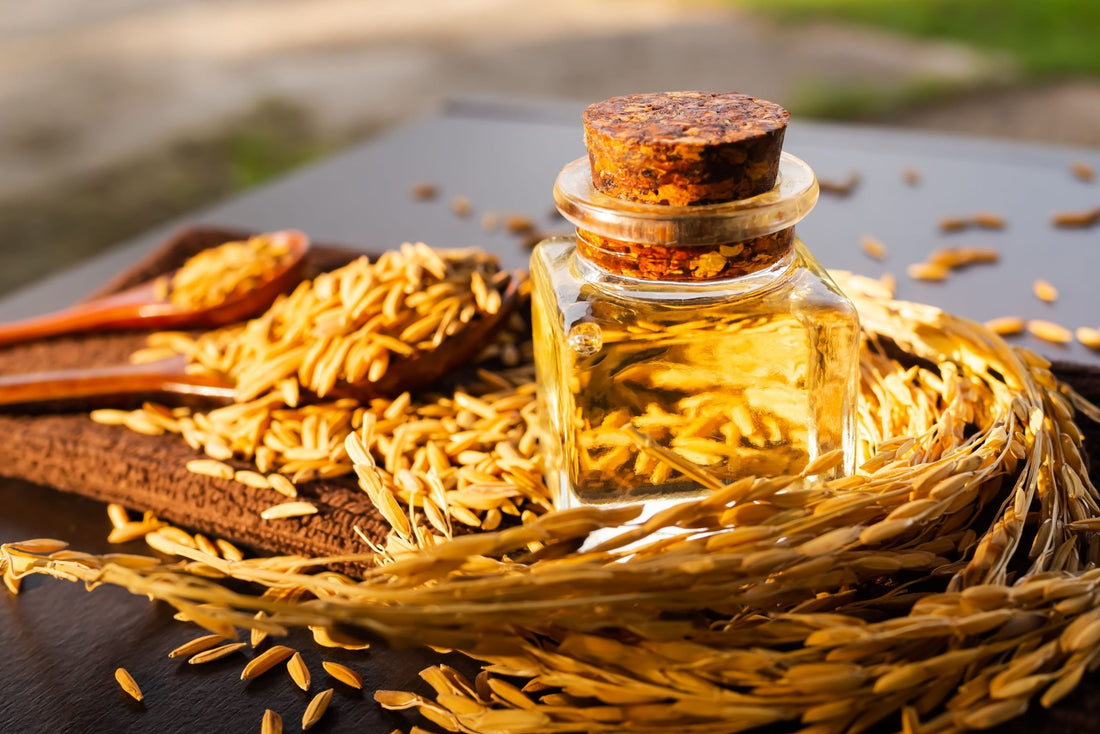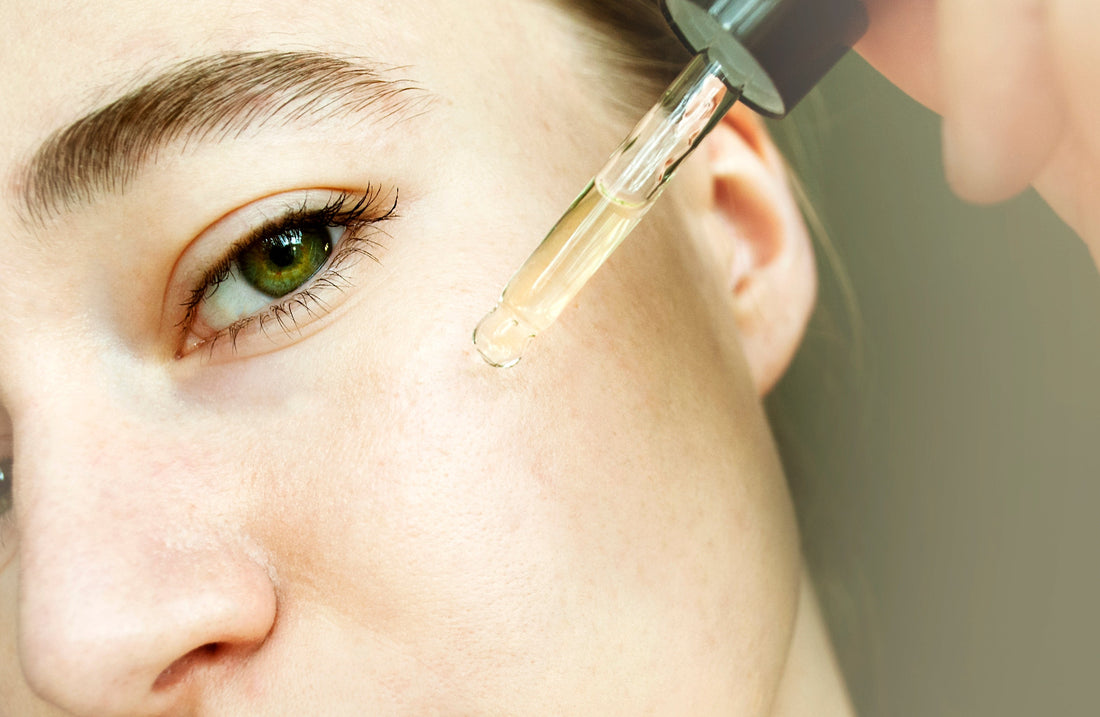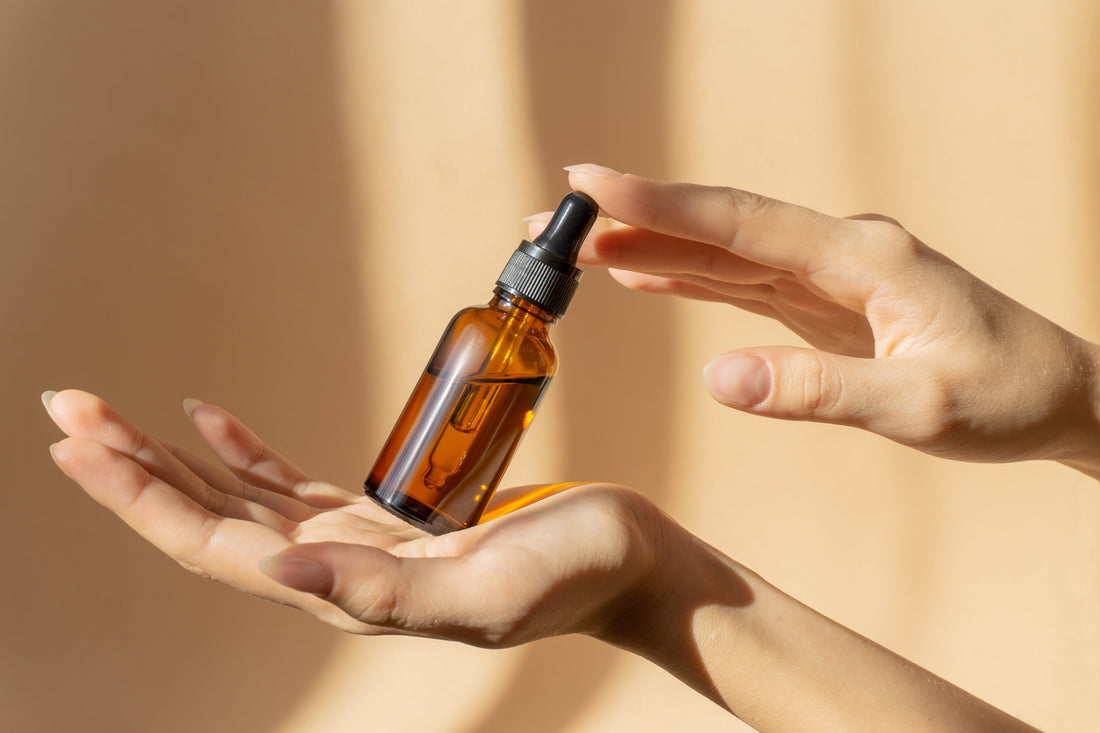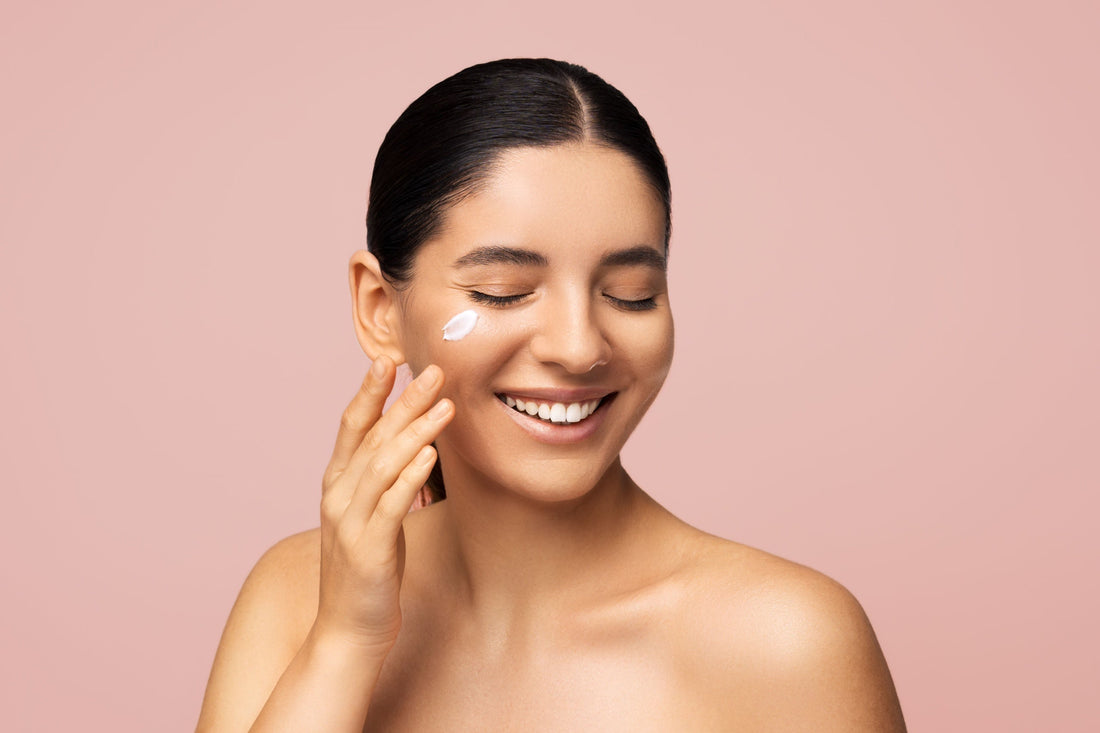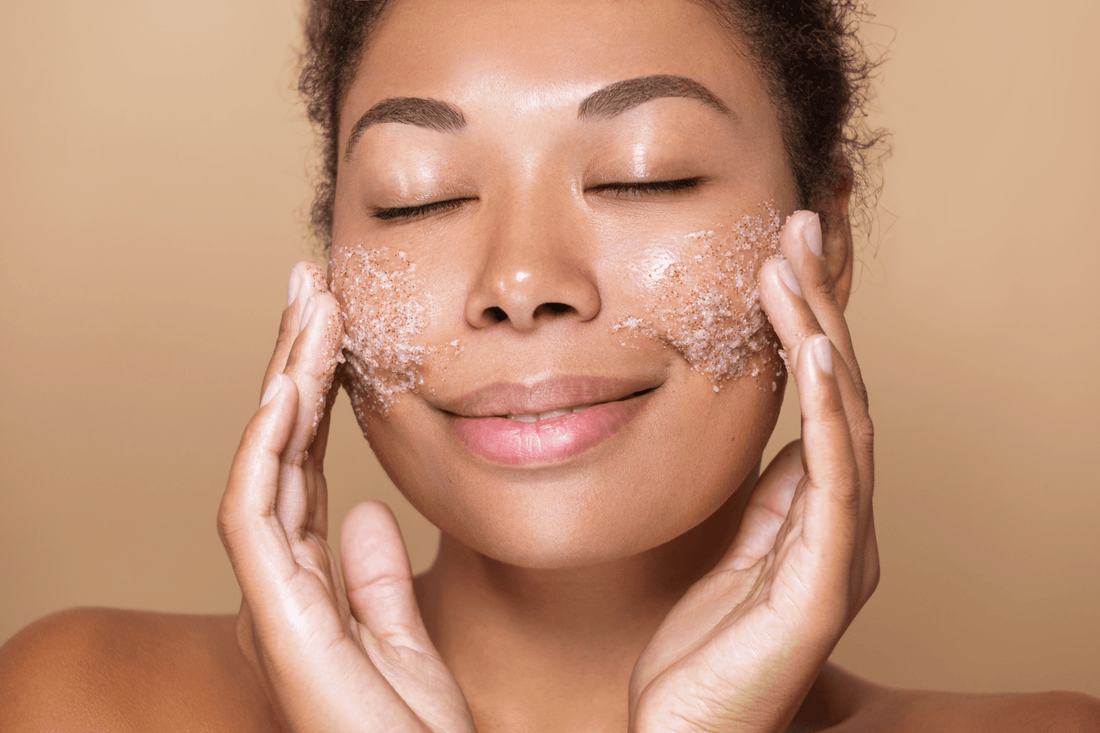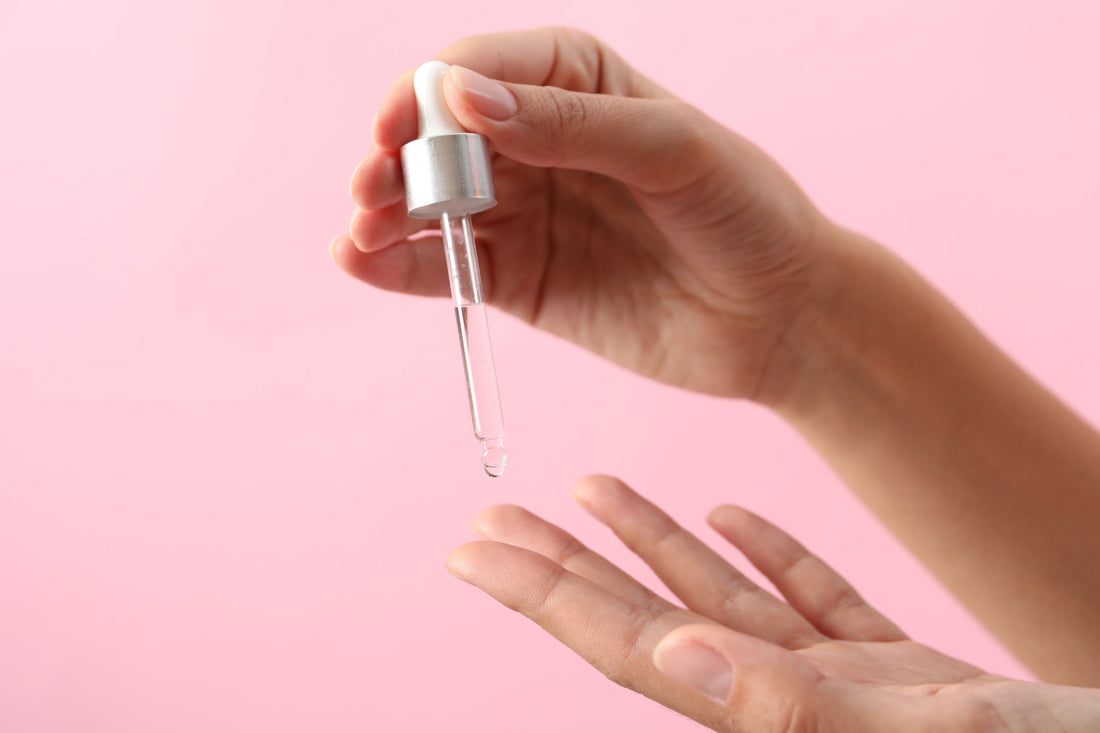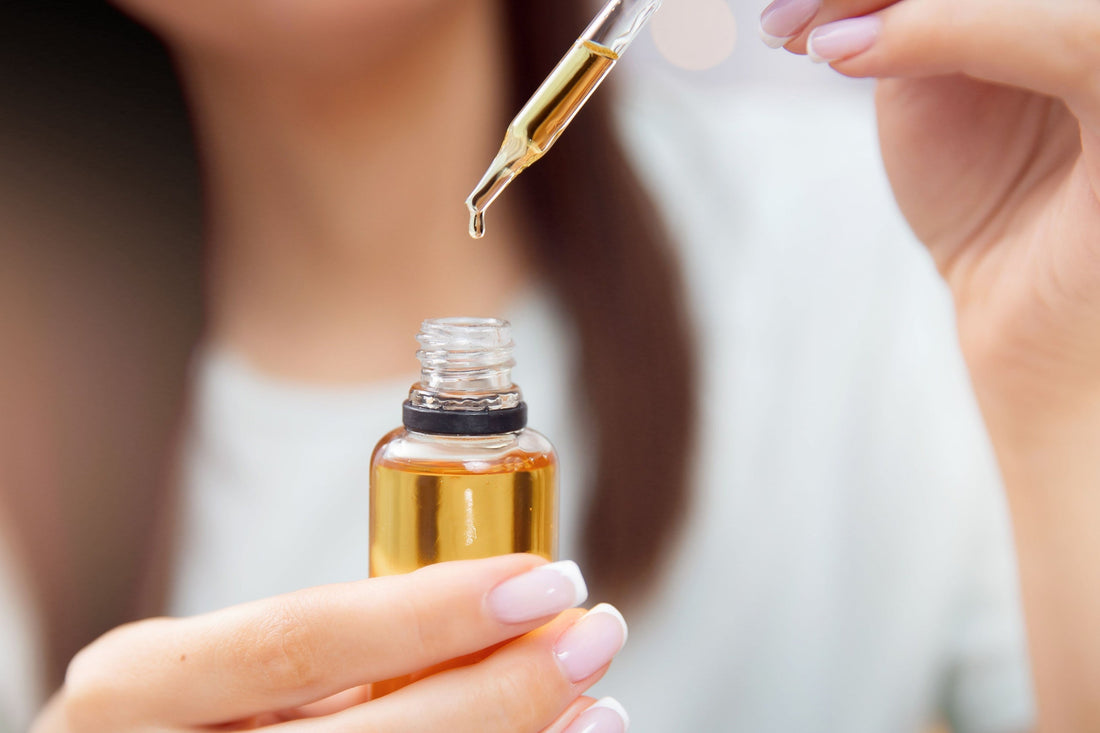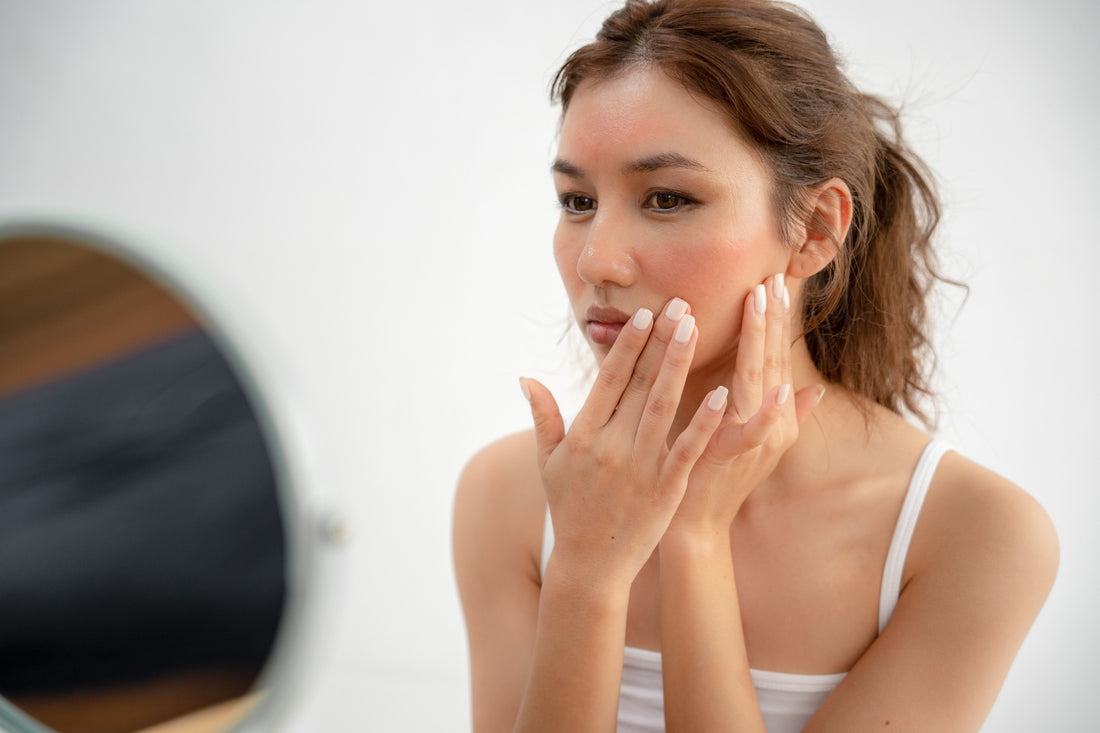Epicuren Blog
What Are Sun Spots and What Can I Do About Them?
Sunspots are a common skin concern that often appear over time in areas frequently exposed to sunlight. Many people look for ways to minimize their appearance for a more even complexion. At Epicuren Discovery, we offer many skincare options to support your skin goals. When it comes to maintaining healthy-looking skin, sun spots are more than just a cosmetic concern. These dark spots often appear after years of sun exposure and are the result of damaged skin cells, and in some cases, they can be precancerous lesions, which increase the risk of skin cancer if left unchecked. That’s why paying attention to skin changes, getting annual skin checks by a dermatologist, and building a consistent skincare routine that includes daily SPF and brightening ingredients is key to minimizing unwanted skin discoloration. Understanding Sun Spots Sun spots, also known as age spots and liver spots, are flat, round spots, unlike freckles, that develop on areas such as the face, chest, shoulders, and hands. They are typically tan to dark brown in color and appear more often in individuals who spend extended time in the sun. These spots may increase in number or visibility with age, especially without consistent sun care. Causes of Age Spots Sun exposure is the most common contributor to the appearance of sun spots. Ultraviolet rays from the sun can influence how melanin, the pigment that gives skin its color, appears in certain areas. Over time, an overproduction of melanin in specific regions leads to visible patches on the skin’s surface. What Do Sun Spots Look Like? Active regions with sun spots are usually small, flat, and darker than the surrounding skin. They may be scattered or appear in clusters and tend to develop in areas that have frequent sun exposure. While they vary in size and shade, they generally have a uniform appearance and do not cause physical discomfort. Another type of melanin dysregulation that looks like sun spots is called melasma. Melasma is often the result of hormonal changes, pregnancy, and birth control. They are generally larger patches of dark spots and can be triggered by heat and the sun. These spots are harder to address since they often start in the deeper layers of the skin and are likely to recur. Discoloration that is raised and is rough in texture may be actinic keratosis. This is a condition that is caused by sun exposure and may develop into skin cancer. Keep in mind, any changes in your skin should be reported to your doctor for an accurate diagnosis. Ways to Lessen the Appearance of Sun Spots Topical Brightening Products Products formulated to improve the appearance of uneven tone can help minimize the appearance of sun spots over time. These may include ingredients such as vitamin C, niacinamide, or licorice root extract, which are commonly used to support the appearance of brightness and more uniform skin tone. Sun Protection Limiting sun exposure is key to maintaining the appearance of your skin. Daily application of broad-spectrum sunscreen with SPF 30 or higher can help keep existing sun spots from becoming more visible and may reduce the chances of new ones forming. Reapplying sunscreen throughout the day, especially outdoors, is essential for optimal sun care. Our Skin Brightening Products If you are looking to support your skin with products that align with your cosmetic goals, explore these high-quality options available through Epicuren: Skin Brightening Serum Skin Brightening Serum is designed to enhance the look of skin tone clarity and refine overall radiance with consistent use. CXC Vitamin C Complex CXC Vitamin C Complex is a concentrated formula featuring three types of stable vitamin C, which is known for supporting the appearance of brightness and refined skin texture. Retinol Anti-Wrinkle Complex Retinol Anti-Wrinkle Complex is formulated with retinol to encourage the look of softer and smoother looking skin. SPF Care Our SPF Collection includes a variety of sun protection products that can be used daily to support the appearance of healthy-looking skin and help defend against visible sun-related changes. Take Our Skin Type Quiz If you are interested in sun spot treatment products, discover your skin type by taking our skin quiz today and decide which products sound right for you. Frequently Asked Questions Are sun spots dangerous? In most cases, sun spots are cosmetic in nature and not a cause for concern. However, if a spot changes in shape, size, or color, it is always a good idea to consult a licensed skincare provider or dermatologist. Can sun spots appear on my hands? Due to their frequent exposure to sunlight, the hands are a common area for sun spots. Wearing SPF on your hands can help protect your skin from most sun exposure and maintain their appearance and support a more even tone. How often should I reapply sunscreen? Sunscreen should be reapplied every two hours when outdoors, or more often if swimming or sweating. Keeping a travel-size bottle on hand can make reapplication easy and consistent. Does age affect the appearance of sun spots? As you age, you can develop age spots and sun spots, and sun damage becomes more noticeable. As the skin’s appearance evolves, supporting it with high-quality skincare and regular sun care can make a visible difference.
Learn moreRice Bran Oil Benefits: The Secret to Brighter, More Radiant Skin
Rice bran oil is a nutrient-rich ingredient known for its skin-nourishing benefits. Rice bran extract is packed with antioxidants, essential fatty acids, and vitamin E. Its lightweight texture absorbs easily, making it suitable for all skin types, including sensitive skin. With its ability to enhance moisture, reduce visible irritation, and help against environmental stressors, rice bran oil is a simple yet effective addition to any skincare routine. What is Rice Bran Oil? Rice bran oil is widely used in skincare for its ability to moisturize the skin and help against the signs of aging. Derived from the outer husk of rice grains, it is packed with antioxidant-rich vitamins such as vitamin E, ferulic acid, and gamma oryzanol, which has antioxidant properties. Its essential fatty acids moisturize the skin, making it ideal for dry, sensitive, or mature skin types. Rice bran oil can also help visibly brighten skin tone, reduce the appearance of dark spots, and improve the look of elasticity, thanks to compounds like squalene and CoQ10. Benefits of Rice Bran Oil for Skin Visibly Brightens Skin Tone Rice bran oil contains ferulic acid and oryzanol, both known for their skin-brightening properties. These compounds help fade the appearance of dark spots, visibly evens out skin tone, and enhance natural radiance. Moisturizing Rich in omega-3 and omega-6 fatty acids, rice bran oil moisturizes s skin without feeling greasy. It can be used as a body oil or in lip balms, keeping the skin feeling soft and supple. Helps Reduce The Appearance of Fine Lines and Wrinkles Rice bran oil is known to have antioxidant and hydrating properties that support your body's natural collagen production, reducing the appearance of fine lines and wrinkles over time. A Winner for Sensitive Skin Rice bran oil is beneficial for sensitive skin due to its gentle, non-irritating properties. It contains antioxidant-rich vitamins like vitamin E and gamma-oryzanol, which are known to help against environmental stressors and visible inflammation. Why Rice Bran Oil is a Must-Have for Glowing Skin Rice bran oil is packed with wonderful natural emollients that moisturize and soften the skin. Rich in vitamin B, rice bran oil helps support a healthy-looking complexion while enhancing moisture and radiance. Gentle Yet Effective Due to its nature, it is suitable for all skin types, including sensitive skin. Lightweight and Non-Greasy Rice bran oil absorbs quickly, making it beneficial for daily skincare. Supports A Healthy-Looking Skin Barrier One of the functions of the skin is to defend against environmental stressors and pathogens. A dry and weakened skin barrier can lead to skin conditions that are inflammatory and/or make skin feel dry and dehydrated. Regular moisturization with healthy plant-based oils can improve the look of skin and support the natural functions of the skin.. Versatile Use It can be found in serums or blended with other skincare ingredients. Who Can Benefit from Rice Bran Oil? Rice bran oil benefits a variety of skin types. It enhances the look of dull or uneven skin, provides moisturization for dryness, and minimizes the look of sensitive or irritated skin. It also helps reduce the appearance of fine lines and signs of aging, promoting a more youthful complexion. Best Skincare Products with Rice Bran Oil Skin Brightening Serum To enhance your appearance, look for serums formulated with rice bran oil and additional brightening ingredients like vitamin C and niacinamide. Epicuren Discovery’s Skin Brightening Serum contains rice bran oil, helping improve your skin's look and feel. Apricot Cream Cleanser A rich formula designed with dry skin in mind, Apricot Cream Cleanser incorporates rice ban oil, apricot kernel oil, and avocado oil for a moisturizing cleansing experience. Recommended Skin Types Dry skin Sensitive skin Combination skin Mature skin Acne-prone skin Normal skin Oily skin By incorporating rice bran oil into your skincare routine, you can effortlessly achieve a brighter-looking and youthful complexion. This oil is a must-have for radiant skin. Frequently Asked Questions Is Rice Bran Oil Okay To Use for Acne-Prone Skin? Rice bran oil is lightweight and non-comedogenic, making it good for acne-prone skin. Can Rice Bran Oil Replace My Regular Moisturizer? Rice bran oil provides moisturization and is formulated into skincare. Does Rice Bran Oil Help with Hyperpigmentation? Due to its brightening properties, rice bran oil can help fade the appearance of hyperpigmentation and even out skin tone over time. Can I Use Rice Bran Oil Daily? Yes, it is suitable for daily use in your skincare routine.
Learn morePatchouli Oil Benefits: The Secret to Soft, Radiant Looking Skin
Patchouli oil is well-known for its aromatherapy benefits and usage as patchouli essential oil. Patchouli oil is now emerging as an ingredient in skincare, helping you achieve glowing and radiant-looking skin. Learn more about the benefits of patchouli oil for your skin and how to use it. What is Patchouli Oil? Patchouli oil is an essential oil derived from the leaves of the Pogostemon cablin plant, a member of the mint family. The patchouli plant is known for its earthy, musky aroma and has been used for centuries in traditional medicine and skincare. This essential oil is a beneficial ingredient in skincare, helping you achieve the appearance of soft and glowing skin. Patchouli Oil Benefits for Skin Moisturizes and Visibly Nourishes While Patchouli oil on its own is not hydrating, adding it to a moisturizing carrier oil blend is the recommended way to apply it to experience the benefits. It is ideal for those struggling with dry skin, flaky skin, or seasonal dehydration. Reduces the Appearance of Inflammation Patchouli oil is known to reduce visible redness and irritation Helps Combat the Appearance of Acne Patchouli oil is known for its antibacterial and antifungal properties, which may help reduce acne-causing bacteria and future breakouts. Has Antioxidant Properties In a 2014 study, Patchouli Oil showed positive effects against UV-induced sun damage, known to degrade collagen, which contributes to wrinkles, fine lines, and sagging skin. Patchouli Oil’s antioxidant properties may help reverse the visible signs of aging. Reduces the Appearance of Excess Oil If your skin is oily or combination, patchouli oil has many benefits, such as antiseptic properties that contribute to a healthier-looking complexion. Visibly Improve Skin Tone and Texture Although patchouli oil is not a tyrosinase inhibitor, its antioxidant properties can help reduce the visible signs of aging, which may include hyperpigmentation. Using patchouli oil can lead to brighter-looking, more even-toned skin. Why Patchouli Oil is a Must-Have for Glowing Skin Reduces Visible Inflammation This oil is known to reduce visible irritation and rednessmaking it beneficial for many skin conditions. Antiseptic Properties It works well on oily skin types, reducing excess oiliness and keeping the skin looking hydrated. Aromatherapy Benefits Beyond skincare, patchouli oil has an Earthy, grounding scent, making it a great addition to your self-care routine. Who Can Benefit from Patchouli Oil? Dry or dehydrated skin. Sensitive or irritated skin. Acne-prone skin. Best Skincare Products with Patchouli Oil Epicuren Sol Exquisite Gemstone Oil The Sol Exquisite Gemstone Oil blend moisturizes the skin while infusing it with botanical extracts, including patchouli oil. The benefits of the carrier oils are combined with other essential oils to improve the look and feel of your skin. Frequently Asked Questions Is Patchouli Oil Okay To Use for Sensitive Skin? Patchouli oil is commonly used on sensitive and irritated skin when diluted properly. Can Patchouli Oil Help with Acne? Patchouli Oil has been used for centuries for its antifungal and antibacterial properties and may help reduce the appearance of breakouts. Can Patchouli Oil Help With Signs of Aging? It is rich in antioxidants that are known to help reduce the visible signs of aging, like wrinkles, fine lines, and loss of elasticity. Can I Use Patchouli Oil Daily? Patchouli oil can be used daily for optimal skin benefits when diluted with a carrier oil or used in skincare formulations.
Learn moreThe Benefits of Witch Hazel in Your Skincare Routine
Witch hazel has been a skincare staple for generations, well-known for its ability to cleanse and help maintain a vibrant-looking complexion. Whether you want to control oil, minimize the appearance of pores, or reduce visible inflammation, witch hazel can be an excellent addition to your daily routine. Learn more about how this natural toner works and how to incorporate it effectively into your skincare routine. What is Witch Hazel? Witch hazel is a plant-derived skincare ingredient known for its astringent properties. Due to its ability to refresh and refine the complexion, witch hazel is commonly found in toners, cleansers, and even cotton pads. Witch hazel has been known to naturally reduce visible skin irritation, minimize the appearance of pores and excess oil on the skin, while helping the skin to appear moisturized. Where Does Witch Hazel Come From? Witch hazel is extracted from the bark and leaves of the Hamamelis virginiana plant. The witch hazel plant has been used for centuries to care for various skin concerns. Nowadays, it is still widely used in skin care, with formulations ranging from pure distillations to alcohol-based toners. Why Use Witch Hazel in Your Skincare Routine? Adding witch hazel to your skincare routine can help you maintain a clear-looking complexion. Its natural astringent properties benefit those with oily or acne-prone skin, while its anti-inflammatory properties have been known to help reduce visible redness and irritation. Benefits of Witch Hazel for Skin Minimizes The Look of Pores Witch hazel helps refine pores, making the skin appear smoother and more even. Regular use may reduce the likelihood of breakouts Reduce The Look of Excess Oil Ideal for oily and acne-prone skin, witch hazel helps reduce the appearance of excess oil without overdrying it. This keeps your complexion fresh while minimizing the look of skin irritation. Reduces Visible Inflammation Witch hazel can help reduce the appearance of redness and irritation, which may benefit those dealing with acne, eczema, or sensitive skin. Clarifying Without Over-Drying Unlike some toners, it has astringent properties, making it an excellent choice for combination skin types. Who Should Use Witch Hazel? Witch hazel extract is a beneficial skincare ingredient for various skin types. It is ideal for individuals who struggle with excess oil, acne, or an uneven complexion. Since it has natural astringent properties, witch hazel can help clarify the skin. However, not all formulations are created equal, and choosing the right one for your specific skin type is essential to ensure the best results. Best Skin Types for Witch Hazel Oily Skin Witch hazel is most beneficial for those with oily skin. It helps minimize the look of excess oil without causing the skin to appear dry. By reducing the appearance of excess oil, witch hazel helps counteract clogged pores, making the skin appear fresher and more refined throughout the day. Acne-Prone Skin Witch hazel is an excellent option for acne sufferers. It helps reduce visible redness and irritation while keeping pores clearer of excess oil and debris. Regular use can help curb breakouts and promote a smoother-looking complexion. Combination Skin If your skin tends to be oily in certain areas, like the T-zone, but dry in others, witch hazel can help. It helps with excess shine where needed while offering lightweight moisture, making it an ideal toner for combination skin. Sensitive Skin Those with sensitive skin can still benefit from witch hazel, but choosing an alcohol-free formulation is crucial. Alcohol can cause irritation and dryness, but alcohol-free witch hazel can provide benefits without the risk of over-drying the skin. Who Should Be Cautious? Dry Skin If you have dry skin, witch hazel should be used with caution. While it does help refine and tone, it may also remove too much natural oil, leading to increased dryness and irritation. If you choose to use witch hazel, be sure to follow up with a hydrating moisturizer. Highly Sensitive Skin Some formulations of witch hazel contain alcohol, which can be too harsh for highly sensitive skin. If your skin is prone to redness, irritation, or allergic reactions, it is best to do a patch test before incorporating witch hazel into your routine. Opting for an alcohol-free version can help reduce the sensitivity while providing the natural ingredients' benefits. When and How to Use Witch Hazel in Your Routine Witch hazel preparations, such as toners and extracts, are commonly used in skincare routines to give the appearance of tightened pores while reducing visible inflammation. Knowing when to use the product can help you maximize the witch hazel benefits. This can ensure that other products are applied in the correct order and that your skin achieves maximal results from the product. When to Use It Morning Witch hazel can be used in the morning as a refreshing toner before applying serums and moisturizers. It helps remove lingering oils from the night and preps your skin for additional skincare products. Evening At night, witch hazel can be applied after cleansing to remove dirt, oil, and makeup traces. It acts as a gentle yet effective second step in your cleansing routine, leaving your skin fresh and ready for nighttime hydration. Why Incorporate Witch Hazel in Your Skincare Routine Incorporating witch hazel into your routine can provide numerous benefits, from minimizing the appearance of pores and oil to reducing visible inflammation. With the right formulation and proper application, it can be a positive addition to your skincare regimen, helping you achieve a vibrant and nourished-looking complexion. Our Witch Hazel Products Epicuren Discovery offers a range of skincare products infused with witch hazel to help tone and clarify the skin. Products like the Brazilian Propolis Mist, Clarify Blemish Eraser, Noni Skin Elixir, Colostrum Duo, Skin Conditioner Enzyme Toner, and Rebalance and Rewind Vegan Collagen Toner include the natural astringent properties of witch hazel to refine pores and refresh the complexion. Whether you want to target blemishes, moisturize, or achieve a more even-looking skin tone, these witch hazel-infused formulas provide a gentle yet effective solution. Frequently Asked Questions Is witch hazel okay for daily use? Witch hazel is okay for daily use, but to avoid irritation, those with dry or sensitive skin should opt for alcohol-free formulas. Can witch hazel help with acne? Witch hazel’s astringent and anti-inflammatory properties have been known to effectively reduce the appearance of breakouts. Does witch hazel dry out the skin? Witch hazel may dry out the skin, mainly if it contains alcohol. It is important that you always follow up with a hydrating moisturizer. Can I use witch hazel with other skincare ingredients? Witch hazel pairs well with hydrating ingredients like hyaluronic acid and niacinamide, but should be used cautiously with strong acids or retinoids.
Learn moreTea Tree Oil Benefits for Skin: Why It’s a Must for Acne-Prone Faces
If you struggle with breakouts, you may benefit from tea tree oil. Known for its natural anti-microbial properties, this essential oil has become a well-known ingredient in skincare. Learn more about why tea tree oil is a must-have for acne-prone skin. What is Tea Tree Oil? Tea tree oil is a natural essential oil extracted from the leaves of the Melaleuca alternifolia plant. Traditionally used by Aboriginal Australians as an antiseptic, tea tree oil is now widely used in skincare products for its potential anti-bacterial and anti-fungal properties. Benefits of Tea Tree Oil for Skin Helps Fight the Appearance of Acne Tea tree oil has been known to have antibacterial properties that target Cutibacterium acnes, the bacteria responsible for breakouts. This makes it an ideal natural option for helping against visible breakouts. Reduces Visible Redness & Inflammation Tea tree oil can help reduce the appearance of irritated skin that can often accompany pimples. Minimizes the Look of Excess Surface Oil Excess oil, dead skin build-up, and bacteria contribute to new pimples, blackheads, and whiteheads. Tea tree oil has antiseptic properties that help remove excess oil that can clog follicles. Natural Alternative to Benzoyl Peroxide Unlike benzoyl peroxide or salicylic acid, tea tree oil offers a plant-based option without common side effects like dryness and peeling. How Does Tea Tree Oil Help with Acne? Helps Reduce the Appearance of Breakouts: Ongoing use has been known to help minimize the look of breakouts, perfect for individuals concerned with acne. Reduces Visible Inflammation: Tea tree oil has been known to help with the visible symptoms associated with pimples. Minimize the Look of Oily Skin: Antiseptic properties are perfect for oily skin types. What Skin Types Benefit the Most from Tea Tree Oil? Oily Skin Combination Skin Acne-Prone Skin Normal Skin (occasional breakouts) Recommended Skin Types Tea tree oil is recommended for these skin types: Oily skin Combination skin Acne-prone skin Types of Skincare Products with Tea Tree Oil Spot Treatments Concentrated formulas target individual blemishes. Toners Refresh and balance the look of your skin while adding a light layer of tea tree oil. Moisturizers Hydrates without being comedogenic and provides many benefits. Masks & Exfoliators Masking and exfoliating may help reduce the appearance of impurities and minimize the look of inflammation. Incorporate a Face Mask Look for masks infused with tea tree oil. Best Tea Tree Oil Products for Clear Looking Skin Epicuren Clarify Blemish Eraser: A targeted spot treatment designed for active breakouts. Epicuren Clarify Polishing Mask: Exfoliates and absorbs excess oil on the skin while targeting the contributors to acne. Epicuren Anti-Aging Lip Balm (Pot) & Tube: A moisturizing lip balm with SPF that contains tea tree oil. When to Expect Results With consistent use, many people notice less visible redness and breakouts within two to four weeks. However, tea tree oil works best as part of a regular skincare routine, so give it time to deliver lasting results. Frequently Asked Questions Can Products With Tea Tree Oil Be Used Daily? Products with tea tree oil can be used daily for existing acne and new breakouts. Do Products With Tea Tree Oil Help with Acne Scars? While products with tea tree oil are great for active acne, they also may help reduce the appearance of minor acne scars over time. Can Tea Tree Oil Replace Salicylic Acid or Benzoyl Peroxide? Tea tree oil is a natural alternative to other ingredients for acne, especially for sensitive skin. However, your skin therapist or medical provider will help you decide what ingredients or medications are best suited for your specific skin concerns.
Learn moreTamanu Oil - The Exotic Oil You May Not Have Heard Of
You are probably familiar with Jojoba Oil or Safflower Seed Oil used in skincare for their moisturizing properties, but there is a lesser-known skincare oil that shouldn’t be overlooked for its many benefits: Tamanu Oil. Tamanu oil may be your new go-to skincare staple. Tamanu oil is derived from the nuts of the Tamanu tree and is packed with nutrients that have all the makings of the perfect skincare oil. Learn about tamanu oil and how this natural ingredient can improve the look of your skin. What is Tamanu Oil? Tamanu oil is an oil extracted from the seeds of the Tamanu tree. It has been used in traditional medicine for centuries and is known for its wound healing, anti-inflammatory, and antioxidant properties. Tamanu oil was traditionally known to treat infected wounds and skin infections and is now recognized for its ability to nourish the skin and reduce visible signs of aging. Tamanu Oil Benefits Tamanu oil, also known as Calophyllum inophyllum seed oil, is a natural emollient celebrated for its impressive skin active properties that promote healthy-looking skin. Rich in fatty acids and antioxidants, Tamanu oil is known to help against environmental factors that contribute to aging and irritated skin. Additionally, Tamanu oil has skin brightening properties that can minimize the look of unwanted dark spots. Its moisturizing properties promote smoother-looking skin, leaving the skin visibly nourished. Why Tamanu Oil Naturally Helps Skin Appear Smooth, Tight, and Youthful Tamanu oil stands out in skincare because of its high fatty acid content and antioxidant properties. There is also evidence that Tamanu oil helps with the appearance of skin firmness and minimizes the look of fine lines and wrinkles. It contains calophyllolide, a compound known for its anti-inflammatory properties, and delta-tocotrienol, a form of vitamin E that is nourishing and known to have anti-inflammatory properties as well. Who Can Benefit from Tamanu Oil? Tamanu oil is ideal for those experiencing the signs of aging or sun damage. It is also ideal for anyone looking for a moisturizing oil that is rich in antioxidants and vitamins. Recommended Skin Types Tamanu oil is recommended for: Normal skin Dry skin Combination skin Mature skin When Will You See the Results? Most people notice smoother, more hydrated-looking skin within one to two weeks. Consistent use over four to six weeks is recommended for more noticeable results. Results may vary based on skin type and individual concerns. Where to Find the Best Tamanu Oil Products? Epicuren's InstantLift Tightening Serum is ideal for daily use and incorporates Tamanu oil for visible results. Frequently Asked Questions Can InstantLift Tightening Serum Be Used On Sensitive Skin? Yes, InstantLift Tightening Serum can be used on sensitive skin, but it should be patch-tested first. Can InstantLift Tightening Serum Replace My Moisturizer? Tamanu Oil in InstantLift Tightening Serum is rich in fatty acids that make it an excellent natural moisturizer; however, we recommend layering InstantLift Tightening Serum under your usual moisturizer since it is a lightweight serum formula. How Often Should I Use InstantLift Tightening Serum? For best results, apply InstantLift Tightening Serum once or twice daily, focusing on areas of concern. Does InstantLift Tightening Serum Help Minimize the Look of Wrinkles and Fine Lines? Yes, InstantLift Tightening Serum has been known to help reduce the appearance of wrinkles and fine lines.
Learn moreTCA-Free Peels: How to Get Glowing Skin Without TCA
Achieving healthy-looking skin does not have to involve harsh chemicals or long recovery times. TCA (Trichloroacetic Acid) peels were once a go-to solution for deep exfoliation, but with increasing concerns over their impact, many are now seeking gentler alternatives. At Epicuren Discovery, we have always prioritized our skincare products with clean, effective formulations free of TCA. Learn why TCA-free skincare at Epicuren Discovery is the best option for your needs. What is TCA (Trichloroacetic Acid)? TCA is a strong acid used in chemical peels to remove the outer layers of skin for a smoother skin texture and more even complexion. While effective, 13-40% of individuals have mild to moderate adverse reactions and a higher percentage of TCA face peels can result in severe skin burns, peeling, irritation, and extended downtime. This aggressive approach can compromise the skin’s natural barrier and lead to sensitivity, redness, and post-inflammatory hyperpigmentation. Why Was TCA Banned in California? California has strict regulations on skincare ingredients, prioritizing consumer safety and environmentalism. TCA was banned due to concerns about its harsh effects, potential for misuse, and long-term effects on skin health. This decision reflects a growing industry shift towards more sustainable skincare products, prioritizing skin well-being while delivering optimal results. Why Epicuren Never Used TCA in Their Peels Epicuren Discovery has been dedicated to formulating effective and gentle skincare products. Instead of relying on peeling agents like TCA, Epicuren focuses on natural enzyme-based exfoliation and mild acids that work in harmony with the skin. These alternatives support healthy-looking skin, effective exfoliation, and enhance the skin’s natural radiance with little to no downtime. The Best TCA-Free Peels for Radiant Skin For those seeking an effective way to achieve a brighter-looking complexion, these TCA-free peels offer transformative results when incorporated into your skincare routine: Enzyme-Based Peels Enzyme peels gently exfoliate the skin using fruit-derived enzymes. Epicuren’s signature enzyme formulations use natural ingredients like papaya and pineapple to promote a smoother-looking texture and visibly even out your skin tone. Lactic acid peels are ideal for dry and dehydrated skin. They provide gentle exfoliation while acting as a humectant. This AHA or alpha hydroxy acid helps to visibly brighten dull skin and is suitable for most skin types, including mildly sensitive.. Glycolic Acid Peels Glycolic acid, another AHA, is known for its ability to visibly refine texture, reduce the appearance of hyperpigmentation, and promote nourished looking skin. This acid is perfect for individuals with sun-damaged and mature skin looking to soften the appearance of fine lines and wrinkles. Salicylic Acid Peels Salicylic acid offers gentle, oil-soluble exfoliation ideal for acne-prone skin. Since peels can increase sun sensitivity, using a broad-spectrum SPF is essential to protect the skin from UV damage, avert hyperpigmentation, and maintain long-term results. Mandelic Acid Peels Mandelic acid can be derived from bitter almonds or synthetically created and is a mild exfoliant ideal for sensitive or acne-prone skin. It is a more gentle AHA, helps against breakouts, smooths the appearance of fine lines, and visibly evens skin tone. Who Should Choose TCA-Free Peels? TCA-free peels are a great alternative for individuals looking to maintain healthy-looking skin while minimizing adverse effects associated with TCA peels. These peels are particularly beneficial for: Sensitive Skin A TCA-free peel, like Mandelic Acid, is ideal for more sensitive skin. These peels offer gentler exfoliation without causing excessive redness, peeling, or discomfort. Acne-Prone Skin For those struggling with acne, TCA-free peels help reduce the appearance of breakouts and excess oil. Aging Skin Individuals concerned with signs of aging can benefit from TCA-free peels, which help soften the appearance of fine lines and wrinkles and visibly fade unwanted dark spots. Anyone Looking for a Natural Alternative? TCA-free peels offer effective exfoliation methods that align with a clean beauty philosophy. These peels support long-term skin goals while visibly improving texture, tone, and radiance. Frequently Asked Questions Are TCA-free products as effective as TCA products? While TCA peels have been used successfully in the skincare industry, growing concern for consumer safety is an important factor to consider. TCA-free peels deliver impressive results over time, similarly to their TCA peel counterparts. Can I use a TCA-free peel if I have sensitive skin? TCA-free peels are designed to be suitable for all skin types, including sensitive skin. How often should I use a TCA-free peel? This depends on your skin type and the specific peel used. Many enzymes and mild acid peels can be used weekly or bi-weekly, while stronger peels may be recommended every four to six weeks. Will I still see results without peeling? Yes, you will still see results. Unlike TCA peels, which cause visible peeling, TCA-free peels provide effective exfoliation without a snake-like peeling. The result is smoother skin without downtime. - A Professional Consultation and Professional Peel should be performed by a licensed esthetician or medical practitioner.
Learn moreHow to Exfoliate When You Have Sensitive Skin
Exfoliation is essential in any skincare routine, helping to resurface the skin, visibly unclog pores, and promote a glowing complexion. But for those with sensitive skin, exfoliating can seem worrisome. With the right products and techniques, you can enjoy the benefits of exfoliation without compromising your skin’s barrier. Why Exfoliation Matters for Sensitive Skin Sensitive skin is characterized by a fragile skin barrier, often leading to redness, dryness, and irritation. Exfoliation, when done correctly, can exfoliate dead skin cells,, help the skin appear nourished, and prepare the skin to receive nutrients from other products. The key is to choose a gentle facial exfoliant that’s specifically formulated for sensitive skin. Choosing the Right Exfoliant for Sensitive Skin At Epicuren Discovery, we understand the needs of sensitive skin. That’s why we offer a range of face exfoliators for sensitive skin that provide gentle yet effective results. Here are some of our top recommendations: Rebalance and Rewind Vegan Collagen Toner This mild exfoliating toner contains lactic acid and botanical extracts that ease visible discomfort and moisturize. Fine Herbal Facial Scrub With finely ground herbs, this scrub provides a gentle physical exfoliation to lift away impurities without over-scrubbing. Apricot Facial Scrub Packed with natural apricot seed powder, this facial exfoliator helps smooth your skin’s texture while nourishing it with botanical extracts. Pumpkin Apple Spice Peel Ideal for a greater exfoliation, this enzymatic peel uses pumpkin and apple enzymes to visibly refine and brighten your complexion. Himalayan Superfruit Enzyme Polish This luxurious exfoliant for sensitive skin combines the power of Himalayan superfruits with gentle enzymes to leave your skin looking polished and refined. Tips for Exfoliating Sensitive Skin Gradually Introduce Exfoliation Individuals with sensitive skin must introduce exfoliation gradually into their skincare routine. Begin with exfoliating your skin once a week and observe how your skin reacts. If your skin tolerates it well, you can increase the frequency to two or three times weekly. Choose the Right Formula Look for facial exfoliants specifically designed for sensitive skin, such as enzyme-based or finely milled scrubs. Avoid harsh physical exfoliators or formulas with large, abrasive particles. Use Gentle Application Techniques Apply your face exfoliator for sensitive skin with light, circular motions. Avoid pressing too hard or scrubbing vigorously, which can irritate delicate skin. Follow Up with Hydration After exfoliating, it is crucial to moisturize your skin. Follow up with a product like the Rebalance and Rewind Vegan Collagen Toner to visibly soften the skin and reveal a rejuvenated-looking complexion. Follow with an application of your favorite moisturizer like Hydro Plus Moisturizer. Protect Your Skin From The Sun Exfoliation can make your skin more sensitive to sunlight. Always follow up with sunscreen during the day to protect your skin from UV damage. Those with sensitive skin tend to love Zinc Oxide Perfecting Sunscreen SPF 27. Incorporating Exfoliation Into Your Routine For sensitive skin, it is important to take a gentle and balanced approach to exfoliation. When you exfoliate you should begin with using a gentle cleanser to remove dirt and makeup. Use a face exfoliant like the Himalayan Superfruit Enzyme Polish or the Pumpkin Apple Spice Peel, depending on your skin’s needs. Apply the Rebalance and Rewind Vegan Collagen Toner to refresh and moisturize your skin. Lastly, you should apply a nourishing moisturizer to lock in hydration. Browse Our Products Sensitive skin does not mean you have to skip exfoliation altogether. With the right facial exfoliant and gentle techniques, you can enjoy smoother, vibrant-looking skin. Explore Epicuren Discovery’s range of products designed to support sensitive skin. Browse our collection of exfoliators and discover the transformative power of gentle, effective skincare today.
Learn moreRetinol for Different Skin Types: Customizing Your Approach
Retinol is well-known in the skincare world and is known for its ability to address concerns such as aging skin, fine lines, and uneven skin tone. However, achieving the best results with retinol requires tailoring its use to your unique skin type. Whether you are new to retinol or looking to refine your routine, understanding how to customize your approach can make all the difference. Learn more about how retinol can benefit you with your skin type in mind. Why Retinol Benefits Your Skin Derived from vitamin A, retinol is one of the most well-researched ingredients in skincare. It is known for its ability to visibly brighten and improve skin texture. These benefits make it an effective ingredient for minimizing the look of fine lines, wrinkles, discoloration, and acne scars. Epicuren Discovery’s Retinol Anti-Wrinkle Cream is formulated with skin-nourishing ingredients, to help your skin look rejuvenated while minimizing irritation. Retinol for Different Skin Types While retinol offers various benefits, its effects can vary depending on your skin type. Here is how to customize your retinol usage: Dry Skin For dry skin, using retinol can lead to flakiness or irritation, which may discourage continued use. To lessen this, consider layering your retinol cream over a hydrating serum or applying moisturizer before and after retinol. Epicuren’s Skin Brightening Serum is an ideal alternative for those with sensitive skin or who want a gentle option. Oily or Acne-Prone Skin Oily skin types often benefit from retinol’s ability to refine pores and reduce the appearance of acne scars. A lightweight retinol serum is ideal for this skin type, as it absorbs quickly without adding excess oil. Regular use can result in a smoother-looking texture and a more even tone. Sensitive Skin Sensitive skin requires a gentle introduction to retinol. Start with a low concentration, applying it only a few nights weekly. Pairing it with a moisturizer can help reduce potential irritation. If sensitivity persists, consider switching to Epicuren’s Skin Brightening Serum, which provides similar benefits with a retinol alternative. Mature Skin Mature skin benefits significantly from retinol’s properties, including its ability to reduce the appearance of fine lines. A rich retinol cream can provide many benefits including moisturization. Pairing retinol with a complementary product like Epicuren’s CXc Vitamin C Complex enhances the brightening effects and helps skin look more firm. Tips for Retinol Use Always use a broad-spectrum sunscreen (SPF 30 or higher) during the day. Start slowly by using retinol two to three times a week, and increase usage as your skin builds tolerance. Avoid mixing retinol with exfoliating acids during the same application. Explore Our Retinol Products Retinol is an effective ingredient that can transform your skincare routine. By choosing products suited to your skin type and complementing them with hydrating ingredients, you can enjoy the benefits retinol has to offer. Explore Epicuren Discovery’s retinol products to find the best match for your skin. FAQs Can I Use Hyaluronic Acid with Retinol? Hyaluronic acid and retinol work hand in hand. Hyaluronic acid helps promote moisture and limits the dryness that retinol can cause. Apply a hyaluronic acid serum before your retinol cream for optimal results. Does Retinol Help with Acne Scars? Retinol promotes exfoliation, which can help fade the appearance of dark spots over time. It also helps to visibly smooth out uneven skin texture. Can I Use Retinol and Vitamin C Together? Retinol and vitamin C can be used together effectively, but it is best to apply them at different times of the day. Use Epicuren’s CXC Vitamin C Complex in the morning to visibly brighten your skin, and follow up with your retinol product in your nighttime routine.
Learn more9 Surprising Skincare Benefits of Jojoba Oil You Need to Know
What Is Jojoba Oil? Jojoba oil is a natural liquid wax extracted from the seeds of the jojoba plant. Known for its versatility, jojoba oil closely mimics human skin's natural oils (sebum), making it an excellent addition to skincare routines. Its lightweight texture, non-greasy feel, and compatibility with various skin types have made it a favorite ingredient in countless beauty products. Learn how Epicuren Discovery’s skincare products can visibly transform your skin with the benefits of jojoba oil. Why Is Jojoba Oil Important for Skincare? Jojoba oil is crucial in skincare due to its unique composition and skin-friendly properties. It is rich in vitamins E and B-complex and minerals like zinc and copper, which promote healthy-looking skin. Its ability to hydrate, and nourish the skin makes it essential for natural and effective skincare. How Does Jojoba Oil Help the Skin? Jojoba oil offers a multitude of benefits for the skin. It hydrates without clogging pores, and can help with irritation. Its versatility makes it suitable for addressing a wide range of skin concerns. 9 Surprising Benefits of Jojoba Oil Hydration Without Greasiness Jojoba oil provides lasting moisture without leaving a greasy residue. Helps Sebum Production for Oily Skin By mimicking natural sebum, it helps with oil levels, visibly reducing excess shine. Fights Acne and visibly Reduces Breakouts Its antimicrobial properties have been known to help reduce the appearance of breakouts . Reduces Visible Irritation and Redness The oil provides many benefits, making it ideal for sensitive or reactive skin. Visibly Reduces Fine Lines Jojoba oil can reduce signs of aging and promote youthful skin because of antioxidants. Free Radical Damage Vitamin E helps reduce the visible effects of environmental damage caused by UV rays and pollution. Natural Makeup Remover Its gentle, oil-based formula dissolves makeup effectively while nourishing the skin. Visibly Improves Skin Elasticity Regular use enhances the appearance of skin firmness and elasticity. Perfect for Delicate Areas Like Eyes and Lips Jojoba oil’s mild nature makes it suitable for the most sensitive areas of the face. Which Skin Types Is Jojoba Oil Good For? Jojoba oil is universally beneficial and can be used on all skin types. Its hydrating and nourishing properties make it an excellent choice for dry, oily, combination, and sensitive skin. Frequently Asked Questions About Jojoba Oil How often should you use jojoba oil in your routine? Daily use in the morning and night, depending on your skin’s needs. Can you use on children’s skin? Its gentle and non-irritating properties make it suitable for children. How does jojoba oil compare to argan or coconut oil? Jojoba oil is lighter than coconut oil while offering a similar range of benefits to argan oil. Our Jojoba Products The Retinol Anti-Wrinkle Complex visibly enhances skin rejuvenation, helping the skin appear smooth. After cleansing, moisturize with After-Bath Body Lotions, designed to keep your skin soft and hydrated all day. Sources https://www.healthline.com/health/beauty-skin-care/jojoba-oil-for-facehttps://www.byrdie.com/jojoba-oil-for-skin-4783234https://health.clevelandclinic.org/jojoba-oil-benefits
Learn more5 Incredible Skincare Benefits of Pumpkin Seed Oil for Skin
Pumpkin seed oil is a well-known ingredient in skincare, known for its ability to visibly nourish, and rejuvenate the skin. Pumpkin seed oil contains vitamins, antioxidants, and essential fatty acids, helping to make your skin look its best. Pumpkin oil offers a range of benefits, perfect for individuals concerned with aging. Whether you want to address acne-prone skin, visibly improve skin elasticity, or hydrate your skin, pumpkin seed oil is a beneficial addition to any skincare routine. Continue reading to learn why this nutrient-rich oil deserves a spot in your skincare routine, and explore our recommended products at Epicuren Discovery. What Is Pumpkin Seed Oil? Pumpkin seed oil, derived from cold-pressed pumpkin seeds, is a nutrient-rich ingredient known for its skincare benefits. Packed with essential fatty acids, vitamins, and antioxidants, this oil is a valuable addition to any skincare routine. Its unique composition makes it effective for various skin concerns, from dryness to aging. Why Is Pumpkin Seed Oil Beneficial for Your Skin? Pumpkin seed oil contains many nutrients that have been known to support skin health. It contains linoleic acid, a key fatty acid for maintaining the skin barrier, and antioxidants like Vitamin E and carotenoids to help with the appearance of free radical damage. Benefits of Pumpkin Seed Oil Hydration Pumpkin seed oil is rich in essential fatty acids and nourishes the skin to visibly hydrate and moisturize the skin. Known To Have Anti-Aging Properties The antioxidants in pumpkin seed oil, including Vitamin E and carotenoids, help with the appearance of free radical damage and reduce the appearance of fine lines and wrinkles. Visible Acne Reduction Pumpkin seed oils contain properties that can help with irritated skin, making the oil ideal for acne-prone individuals. Improved appearance of Skin Elasticity This oil, packed with zinc and Vitamin C, supports collagen production, improving the appearance of skin firmness and elasticity. Brightening Effect The high Vitamin A and beta-carotene content helps to even skin tone and visibly brighten your complexion. When Should You Use Pumpkin Seed Oil in Your Routine? To maximize its capabilities, the best time to incorporate pumpkin seed oil into your routine is during the evening. It can be used as a standalone oil after cleansing and toning or blended with your moisturizer to lock in hydration. If used in the morning, follow up with sunscreen since Vitamin A can increase sun sensitivity. Best Skin Types for Pumpkin Seed Oil Dry Skin Pumpkin seed oil has been known to hydrate and visibly help improve the lipid barrier of the skin, minimizing the appearance of dry skin. Oily and Combination Skin Pumpkin seed oils can help minimize oil production, making it suitable for those with oily or combination skin types. Acne-Prone Skin Pumpkin oil is known for its anti-inflammatory and antibacterial properties, making it ideal for acne-prone skin, helping reduce visible redness and breakouts. Mature Skin Pumpkin seed oil enhances skin elasticity and reduces the appearance of wrinkles for mature skin. Our Recommended Products Pumpkin Apple Spice Peel This exfoliating peel, rich in phytonutrients and antioxidants, visibly resurfaces your complexion. This is beneficial for brightening dull skin and improving the appearance of skin texture. Skin Rejuvenation Therapy Moisturizing Cream The moisturizer is formulated with pumpkin seed oil to deliver intense hydration and therapeutic benefits to your skin. FAQs About Pumpkin Seed Oil for Skincare Is pumpkin seed oil non-comedogenic? Pumpkin seed oil is non-comedogenic and will not clog your pores. It is lightweight and absorbs easily onto the skin, making it an excellent option for all skin types. How often should you use pumpkin seed oil? Pumpkin seed oil can be used daily to combat dryness and irritation, either as part of your evening routine or as needed. Can pumpkin seed oil replace a moisturizer? While pumpkin seed oil is highly moisturizing, it works best when paired with a moisturizer. For optimal results, use a hydrating cream formulated with pumpkin oil.
Learn moreWhy is My Skin Sensitive to Touch All of a Sudden?
Sensitive skin is a common concern that can leave your skin feeling tight, itchy, and prone to redness or irritation. While it can affect anyone, understanding what causes sensitive skin and how to care for it can make a significant difference. In this blog, we will explore the causes of sensitive skin, provide tips for keeping it vibrant looking, and introduce you to Epicuren Discovery’s skincare products designed for those concerned with sensitive skin. What is Sensitive Skin? Sensitive skin is often characterized as highly reactive, easily reddened, or sensitized. This can be due to your lifestyle and health, such as skincare products, environmental factors, or even stress. Symptoms may include redness, dryness, itchiness, or a burning sensation. This condition can be temporary or chronic and varies from person to person. What Causes Sensitive Skin? Sensitive skin may develop for various reasons, including: Allergic Reactions Allergies to specific ingredients in skincare products, laundry detergents, or foods can trigger sensitivity. Symptoms include redness, swelling, or itchiness. Certain Skin Conditions Skin conditions like eczema, rosacea, and psoriasis make the skin more vulnerable to irritation and can amplify sensitivity. Skin Care Products Some common skincare ingredients can disrupt the skin barrier or cause allergic reactions for some people, leading to sensitized skin. Sun Overexposure to the sun’s UV rays can damage the skin barrier, create inflammation, and lead to irritation or hypersensitivity, especially in individuals prone to sunburn. Health Issues Hormonal changes, autoimmune disorders, and chronic illnesses like diabetes can increase skin sensitivity. Tips for Keeping Your Skin Looking Vibrant Caring for sensitive skin requires a mindful approach to skincare and lifestyle choices. Here are some tips: Avoid Over Washing or Exfoliating Too Much While cleansing and exfoliating are essential, overdoing it can strip your skin of natural oils. Use a gentle cleanser and exfoliate no more than one to two times per week. Use Fragrance-Free Products Choose products labeled as fragrance-free, hypoallergenic, and free of dyes to minimize irritation. Moisturize Your Skin A good moisturizer is known to visibly help the skin barrier. Look for products designed specifically for sensitive skin. Stay Out of the Sun Wear sunscreen daily, preferably one with zinc oxide or titanium dioxide, and use protective clothing to minimize sun exposure. Contact a Dermatologist or Allergist If your sensitivity persists, consult a dermatologist or allergist to identify triggers and develop a personalized care plan. Our Skincare Products with Sensitive Skin In Mind At Epicuren Discovery, we offer a range of products crafted to nurture skin. From gentle cleansers to hydrating moisturizers, our skincare line is designed for all skin types in mind. Explore some of these products for more sensitive skin Frequently Asked Questions What is the best thing for sensitive skin? The best approach for highly sensitive skin is using gentle, fragrance-free skincare products, keeping your skin moisturized, and protecting it from sun exposure. What are the four types of sensitive skin? The four types are naturally sensitive (aka genetic predisposition), environmentally sensitive, reactive, and thin skin. These can include things like heat sensitivity, dehydrated/dry skin, and contact or allergic dermatitis. Which ingredient is not good for sensitive skin? Some ingredients like alcohol, fragrances, sulfates, and exfoliants can irritate sensitive skin. What is the best face moisturizer for sensitive skin? A fragrance-free, non-comedogenic moisturizer with ingredients like hyaluronic acid or ceramides is ideal. What is the best serum for sensitive skin? Look for serums with ingredients like niacinamide or aloe vera to ease visible irritation. What is the best cleanser for sensitive skin? A gentle cream or gel cleanser free of fragrances works best for sensitive skin. -- This blog is for informational purposes and is not a substitute for professional medical advice. If you experience severe or persistent sensitivity, consult a dermatologist or healthcare provider. -- References Healthline Medical News Today Verywell Health
Learn more


